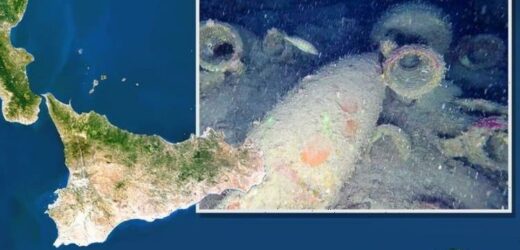Italy: Roman-era shipwreck discovered by Arpa
We use your sign-up to provide content in ways you’ve consented to and to improve our understanding of you. This may include adverts from us and 3rd parties based on our understanding. You can unsubscribe at any time. More info
The Roman vessel, which was carrying jars of ancient wine, sank to the bottom of the Mediterranean near Isola delle Femmine, northwest Sicily. Archaeologists have dated the ship’s remains to about 2,200 years ago, meaning it predates the birth of Jesus Christ. According to a statement released by the Regione Siciliana (Sicilian Region) portal, the wreck was found at a depth of about 300ft (92m).
Experts accessed the ship’s remains using a submersible robot, dubbed ROV, that was guided from the oceanographic vessel Calypso South.
The explorers knew they had stumbled upon something significant when their robot beamed back pictures of “a conspicuous load of amphorae”.
Amphorae – from the Greek word “amphoreus” – are a type of tall container with two handles used in the world of antiquity to store liquids and foods.
The containers found off the coast of Sicily were most likely used to store wine.


According to Alberto Samona, councillor of Cultural Heritage and Sicilian Identity, the discovery “is perhaps one of the most important findings of recent months”.
The find highlights the bustling trade that went on along the coastlines of the Mediterranean Sea.
The island of Sicily was the first province conquered by the Roman Republic and was partially conquered in 241 BC.
During the heyday of the Roman Republic, the island supplied the Italian mainland with grain – a source of great contention for the island’s native residents.
Valeria Li Vigni, superintendent of the sea of the Sicilian region, praised the Mediterranean’s role in shedding new light on the region’s ancient past.
Greece: Divers explore Peristera shipwreck off Alonissos in 2019
In a statement, which was originally published in Italian, she said: “The Mediterranean continually gives us precious elements for the reconstruction of our history linked to maritime trade, the types of boats, the transport carried out.
“Now we will know about life on board and the relationships between coastal population.”
The wine trade was a particularly lucrative business in the Roman age.
According to Las Stampa, Rome’s emergence as the de facto power in the Mediterranean made wine trading one of the biggest businesses of the time.


And this is not the only shipwreck full of ancient treasures discovered in the Mediterranean.
Earlier this year, archaeologists reported the discovery of a treasure trove of coins and artefacts off the coast of Israel.
The discovery came to light when a pair of divers in the Roman harbour of Caesarea came across the lost cargo of a 1,600-year-old Roman merchant vessel.
The treasure was investigated by the Israel Antiquities Authority (IAA), which dated some of the recovered artefacts to between 308 and 324 AD.
Archaeologists were also left stunned by an ‘absolutely incredible’ shipwreck uncovered in the Black Sea.
The discovery has been hailed the world’s oldest intact shipwreck, dating back some 2,400 years.
Dr Helen Farr, a marine archaeologist from the University of Southampton, told the Telegraph in 2018: “Normally we find amphorae (wine vases) and can guess where it’s come from, but with this it’s still in the hold.
“It’s absolutely incredible. It’s to do with the preservation, we have bits of shipwreck that are earlier but this is intact, it’s lying on its side it’s got its mast, its rudders, it’s just not something you see every day.”
The ship likely supplied the Greek colonies along the Black Sea coast.
Source: Read Full Article


